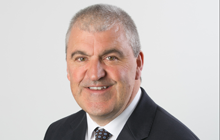
EA: What do you believe is the most effective financing model for catalysing a green recovery and the transition to a circular economy – and why?
RB: I do not believe there is one "most effective" financing model, however the finance sector does need to adopt a positive mindset to facilitate and finance the transition to a circular economy. The financing model will depend on the commercial maturity of a business or the type of project being financed and so it may include anything from early-stage equity investment to commercial bank debt for more mature businesses.
EA: How do you define sustainability?
RB: I still like the Brundtland definition. Sustainability focuses on meeting the needs of the present without compromising the ability of future generations to meet their needs. Sustainability encourages businesses to frame decisions in terms of environmental, social, and human impact for the long-term, instead of short-term gains such as next quarter's earnings report. Sustainability influences businesses to consider more factors than simply financial performance.
EA: What tools and systems do you use for assessing whether a business meets sustainability criteria for investment? How do these align with the SDGs, or TCFD/SBT initiatives?
RB: Earth Capital has fully integrated a performance-focused investment philosophy with Environmental, Social and Governance (ESG) metrics into our entire investment process. Our Earth Dividend™ system provides an annual measure of an investment’s sustainable development impact. The five categories – natural resources, ecosystem services, pollution, social & economic contribution and society and governance – that the Earth Dividend is centred around feed into 30 wider indicators that can be mapped to the UN Sustainable Development Goals. We then build on these outputs with a TCFD questionnaire to understand the potential climate risks and opportunities our investments face. This is now being developed further to establish net-zero commitments for our portfolio companies.
EA: How do you (and the companies you work with) translate sustainability targets into business strategy and deliverables? Is the commercial case for doing that clear?
RB: The Earth Dividend is established for each portfolio company as part of our due diligence process and is reported annually. Our sustainability team works with every company to identify improvements where they can add value. These development plans target annual improvements in our investment's contribution to sustainable development in order to enhance the underlying commercial performance of the asset and maximise value on exit.
EA: Are companies with a clear sustainability mission attractive to private investors? What is the best way of supporting companies facing the trickier task of transitioning from unsustainable practices to sustainable ones, especially where the longer-term costs of the transition outweigh the returns?
RB: Companies with a clear sustainability focus are increasingly of interest to private investors. My view is that the transition to a low-carbon future is an inevitability and not an option. The economic arguments in favour of the transition will improve over time and companies will need financiers who understand that pathway. We have already seen this with the UK’s offshore wind sector which was more difficult to finance a decade ago. Now, the clean energy boom is forcing forecasters to revise their figures due to the unprecedented demand for renewables.
EA: What are your views on whether government and private finance should work together to facilitate large-scale change? Do you see any instruments as having particularly strong potential?
RB: I have no doubt that public-private cooperation will be needed. The first role of government is to set long term targets and price signals. A carbon tax is one method, but standard setting is also important to driving the sustainability agenda. Finance needs to value the true cost of business activities and proactively ensure that capital acts for long term value creation. We are seeing this with climate and green bonds as well as sustainability linked loans. Impact investing will also a be critical tool too.
----
Hear more at the UK Business Summit
Hear more from Richard at the UK Business Summit 2021 - Delivering a Sustainable Recovery on 22-23 June, where Richard will be joining a panel session on Demonstrating Leadership in Environmental, Social and Governance (ESG) & Developing Positive Sustainability Strategies.
